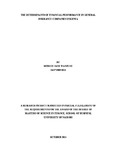The Determinants of Financial Performance in General Insurance Companies in Kenya
Abstract
The contribution of general insurance industry in Kenya to her gross domestic product
is at 2.08 %. This is quite low inspite of the rising awareness of the importance of
insurance and the efforts by insurance companies to expand their presence. This is by
introducing micro insurance and takaful, as well as use of alternative distribution
channels. In this context, the present study tried to establish the factors determining
the profitability of non-life insurers operating in Kenya taking return on asset as
dependent variable. The sample for this study include all the 23 general insurance
companies in Kenya and it used the data pertaining to four financial years from year
2009-2012. For this purpose, firm specific characteristics such as leverage, retention
ratio, liquidity, underwriting risk, equity capital, size, management competence index,
ownership and age were regressed against Return on Assets. This study led to the
conclusion that profitability of general insurers in Kenya is positively and
significantly influenced by leverage, equity capital, and management competence
index. Size of the firm (measured as the natural logarithm of total assets) and
ownership structure (foreign ownership) have a negative and significant effect on
performance of general insurers in Kenya. Further, liquidity has a negative and a
marginally significant effect on performance of general insurers in Kenya. The study
does not find evidence for the effect of age of the firm on performance of general
insurers in Kenya. The study recommends that for general insurers in Kenya to
perform better in terms of their return on assets, they should improve on their
leverages, equity capital and quality of staff.
Citation
School of Business,Publisher
University of Nairobi
Description
Thesis

